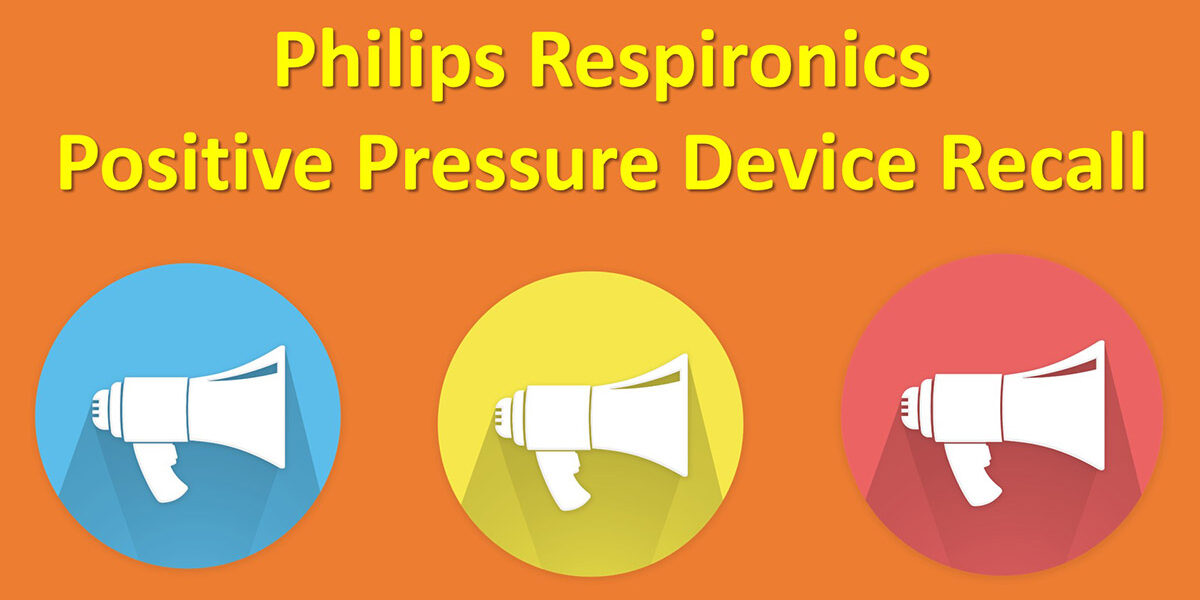June 21, 2021 (THIS STATEMENT IS UPDATED SINCE JULY 9TH 2021, CLICK HERE TO READ THE UPDATED STATEMENT)
The purpose of this document is to inform Health Care Providers (HCP) and patients with regard to the recent recall notice. CSS Executive members have been in discussions with other professional societies and HCPs across Canada to obtain accurate information. This is an evolving situation, and we hope to update these suggestions once more data is available.
This is what we know:
- Philips Respironics issued a recall notification of many of their positive airway pressure (PAP) devices on June 14, 2021 due to possible harm secondary to breakdown of the polyester based polyurethane (PE-PUR) sound abatement foam.
- Breakdown of the foam, which may be worsened by heat/humidity and use of non-authorized cleaning methods (e.g. ozone), may result in generation of particulate matter and volatile organic compounds (VOC).
- These may cause irritation and airway inflammation of the respiratory tract as well as other toxic effects (headache, potential carcinogenic effects)
- The risks of continued use of recalled devices are unclear, but the number of complaints to the manufacturer has been low (0.03% in 2020)
- There are tangible risks associated with stopping PAP abruptly especially in patients with significant comorbidities and/or substantial sleepiness. This includes reemergence of excessive daytime somnolence and associated complications such as worsening sleep quality, quality of life, motor vehicle crash risk, and potentially worsening cardiovascular risk or respiratory failure.
- Timelines for replacement or repair of devices by the manufacturer are unclear, but may take many months
- ResMed devices are not affected by the recall as different materials are used in the devices
Preliminary recommendations:
- In accordance with manufacturer’s recommendations, we advise that patients be contacted as soon as possible by their home care providers or physician and be advised of the risks associated with the use of recalled devices.
- Patients and/or home care providers should use the Philips registration site to look up the serial number of the device to see if it is affected, register their device and begin a claim as appropriate. Here is the link to the site: https://www.philipssrcupdate.expertinquiry.com/
- For patients using life sustaining ventilators, therapy should not be stopped abruptly. Patients need to consult with their physician and homecare providers quickly to determine the best course of action and identify alternative options.
- For others, we would recommend immediate discontinuation of affected CPAP and BiPAP therapy and switching to a device not subject to the recall as soon as possible; patients should contact their home care providers to make arrangements to do so. However, if an alternative device cannot be secured in a timely manner, the decision to continue use of a recalled device for a prolonged time period needs to be individualized after discussion between the patient and physician. This needs to balance the risks of discontinuing PAP with the risks of continued exposure to foam products. Other sleep apnea therapies (oral appliances, surgery, etc.) might be considered in this context.
- In-line bacterial filters can be considered to reduce particulate matter exposure in some devices (Trilogy 100 and 200). The use of these in other devices is unclear due to potential changes in pressure delivery, interaction with the humidifier, etc. Also, the filter will not reduce VOC exposure. Further information regarding the best course of action should be forthcoming from the manufacturer.
- For in laboratory titration studies, we would recommend not using recalled devices. If there is no alternative (e.g. in home titration) and an urgent in-laboratory titration is required, we would suggest discussion with patients in terms of risks and benefits; informed consent for the procedure should be obtained. Consultation with risk management would be helpful under these conditions.
- For all patients on PAP devices, we would recommend using the cleaning methods described in their device’s Instructions and discontinue unauthorized cleaning methods for all PAP devices. Please see FDA statement (https://www.fda.gov/news-events/press-announcements/fda-reminds-patients-devices-claiming-clean-disinfect-or-sanitize-cpap-machines-using-ozone-gas-or)
We are monitoring this rapidly changing situation carefully. We are also in discussion with the Canadian Thoracic Society regarding future statements on this important issue.
Other useful links:
https://aasm.org/clinical-resources/guidance-philips-recall-pap-devices
https://www.resmed.com/en-us/other-manufacturer-recall-2021/

